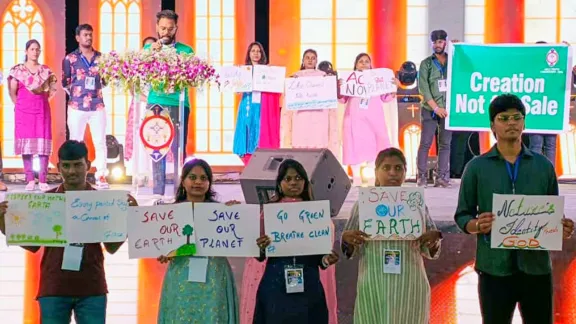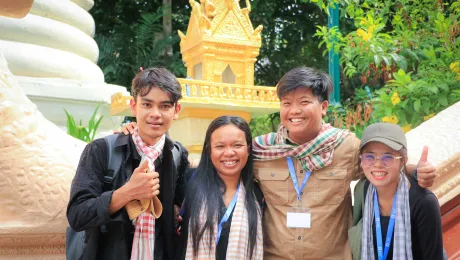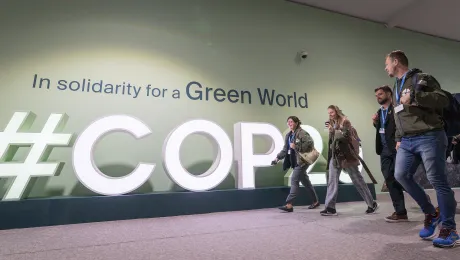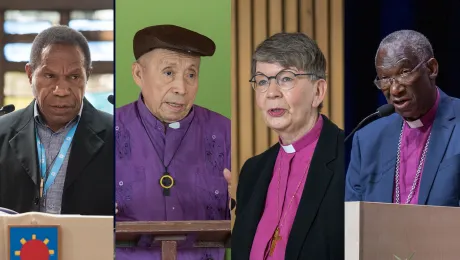A young delegate and a steward from the Andhra Evangelical Lutheran Church in India share how the experience of the Krakow Assembly has shaped their engagement with challenges in their Asian context

Participants at the Andhra Evangelical Lutheran Church (AELC) youth convention take part in climate justice activities. Photo: AELC
Youth leaders share how Krakow Assembly inspires their work on social justice, interfaith dialogue, climate activism
(LWI) - Serving as a youth delegate and a steward for the Lutheran World Federation (LWF) Thirteenth Assembly was an “enriching and enlightening experience” for two members of the Andhra Evangelical Lutheran Church in India (AELC). Krupa Sastry Pilli and Sankeertana Kommalapati say their time in Krakow significantly impacted the way they are responding to local challenges, including “a caste-based mentality which persists” in both the church and wider society.
Krupa is a 25-year-old theology student completing his final Bachelor’s year at United Theological College, an ecumenical seminary in the southern city of Bangalore. The son of an itinerant Lutheran pastor, he spent his early years travelling in the rural towns and villages of Andhra Pradesh state and saw firsthand the damage inflicted by the caste system which extended to church participation and practice.
“If we compare today with the past, conflict around this caste system has been reduced, but not eradicated,” he reflects. “There is a saying in India that the caste is inside the blood of the people and although there are no longer caste-based churches, there is still a feeling in people’s minds which affects the way they think and behave.”
The Krakow Assembly was a very valuable experience for me to meet so many young people from around the world and to discuss issues from my own context.
Sankeertana Kommalapati, AELC delegate to the LWF Thirteenth Assembly
Sankeertana is a 30-year-old senior associate working in IT with a focus on artificial intelligence, specializing in developing and testing robot technology. She lives in the city of Guntur where she and Krupa recently helped to organize an AELC youth convention bringing together two thousand young people to discuss key themes from the LWF Assembly and youth Pre-Assembly. The theme of the 14 to 17 January convention was ‘Identity: Embrace your divine design’.
“As a delegate to the Krakow Assembly, it was a very valuable experience for me to meet so many young people from around the world and discuss issues from my own context,” she says. “The theme of ‘One Body, One Spirit, One Hope’ gave us so many ideas about ways of engaging with those issues and solving problems that exist for people in our local churches,” she adds.
Serving as a steward in Krakow, Krupa also found that the discussions in plenary sessions and in informal settings “really broadened my understanding and opened up different perspectives to get to know my own community better,” he notes. Among the top challenges facing young people in Asia he says, are the challenges of intergenerational and interfaith dialogue, as well as the way climate change is impacting local communities.
Dialogue to overcome discrimination
“India is a multicultural and multi-religious society,” Krupa continues, “and in some areas, such as the north-east of the country, we have seen serious persecution against Christians with churches destroyed. At the same time, some Christians are openly blaming other religions for the chaos, rather than seeking to create harmony and respect through dialogue with people of other faiths.” Secular politicians are seeking to divide faith communities, and “these divisions are brought into the church, so we must educate young people to be aware of this,” he insists.
In her company environment, Sankeertana says her colleagues know that she is a Christian and she has never experienced discrimination. “But in some other institutions, I have seen Christians rejected for jobs because they are from a minority background,” she adds. One of four public statements issued at the conclusion of the LWF Assembly expressed solidarity with members of minority churches facing discrimination and persecution in the Asia region. In particular, the Assembly called on “the government of India and other governments to ensure the protection of human rights, justice and dignity for all.”
Climate justice was another priority concern for young people attending the Krakow Assembly and it was also on the agenda for the AELC convention organized by Krupa and Sankeertana. In Guntur, where the meeting took place, they note that temperatures can now reach 50°, seriously impacting the poor and the elderly, while problems of drought and flooding are commonplace in other parts of the country.
“I was very much moved by the climate justice campaign at the Assembly,” says Krupa, who presented at the Pre-Assembly a song which has written with lyrics warning about the threats of global warming. “I was very inspired by the activism of the youth in Krakow so we also organized a rally at our convention,” he notes. “Our bishop was also involved with that, so I was very happy that our voice is being listened to” he concludes.


